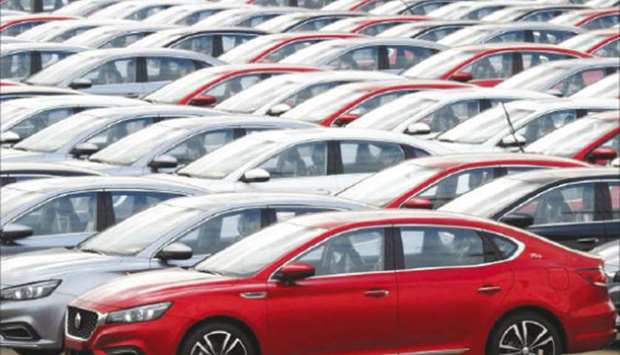Car sales in China fell to fresh lows in January as the coronavirus kept buyers away from showrooms, intensifying the gloom hanging over the industry.
Retail car sales fell 22% to 1.71mn units, the biggest-ever drop for the month of January, the China Passenger Car Association said yesterday.
The group predicted a worsening outlook, saying February sales may drop more than 30%. The outbreak is exacerbating manufacturer and dealership woes in the world’s biggest market, which is also being hit by a slowing economy and trade tensions.
Sales were heading for an unprecedented third straight annual decline even before the virus forced authorities to lock down the epicentre of Wuhan and beyond.
“We had the worst January ever in terms of retail,” said Cui Dongshu, PCA’s secretary general. “Pressure on retail has never mounted to such level since we started tracking the data.”
Full-year sales may decline 5%, provided that the virus outbreak starts to steadily fade in April, PCA said.
Sales to dealerships fell 20% to 1.61mn cars last month, the China Association of Automobile Manufacturers, another industry body, said yesterday.
That’s the biggest monthly drop since January 2012.
Electric vehicles led the decline, with January new-energy vehicle sales falling 54%, CAAM said.
EVs and traditional premium models will suffer the most from the outbreak because sales of those vehicles are concentrated in the biggest cities, which happen to be the ones most affected by the epidemic, according to Robin Zhu, an analyst at Sanford C Bernstein & Co.
Electric-car sales have already been plunging for months in China, the world’s biggest market for such vehicles, after the government scaled back purchase subsidies in July.
Tesla Inc, which started deliveries a few weeks ago from its new Shanghai factory, its first outside the US, has been bucking the trend with increasing registrations.
Companies, analysts and investors are struggling to assess the financial toll of the virus, with the number of infections rising by the day.
Carmakers are particularly vulnerable because Hubei is China’s fourth-largest auto-making hub and home to factories of companies ranging from Dongfeng Motor Corp to Honda Motor Co and General Motors Co.
Companies such as market leader Volkswagen AG to Tesla and Toyota Motor Corp have warned of disruptions in their operations.
Automakers probably will dial back production by 15% in China this quarter after extending holiday shutdowns because of the virus, supplier Aptiv Plc estimated.
While factories and dealers are gradually starting to resume operations after two weeks’ suspension, massive challenges remain. A majority of dealerships remained closed this week for failing to meet the government’s criteria to resume business, and inventories are at elevated levels.
As of Wednesday, 59 of China’s 183 auto-industry production bases tracked by CAAM had resumed output, according to the association. CAAM estimates the coronavirus outbreak will disrupt production of more than 1mn vehicles, it said.
The outbreak has also endangered component supply.
Parts manufacturers across China have suspended production through last week and in the case of Wuhan city and the surrounding Hubei province, factories are still largely closed.
Some parts suppliers may face bankruptcy, said Xu Haidong, a vice chief engineer at CAAM.
That leaves car plants at risk also outside China: South Korea’s Hyundai Motor Co and Japan’s Nissan Motor Co are among carmakers that have halted some production in their home countries because of component shortages caused by the virus.

Cars for export wait to be loaded onto cargo vessels at a port in Lianyungang, Jiangsu province. Retail car sales fell 22% to 1.71mn units, the biggest-ever drop for the month of January, the China Passenger Car Association said yesterday.
